Chinese tattoos are an incredible way to express oneself, conveying a deep and meaningful message through intricate and beautiful designs. These tattoos have long been popular due to their rich symbolism, and they remain in vogue today. From dragons to koi fish, each symbol carries its own unique meaning. In this article with Impeccable Nest, we will explore the world of Chinese tattoo meanings, providing insights, examples, comparisons, and advice for those seeking to get inked.
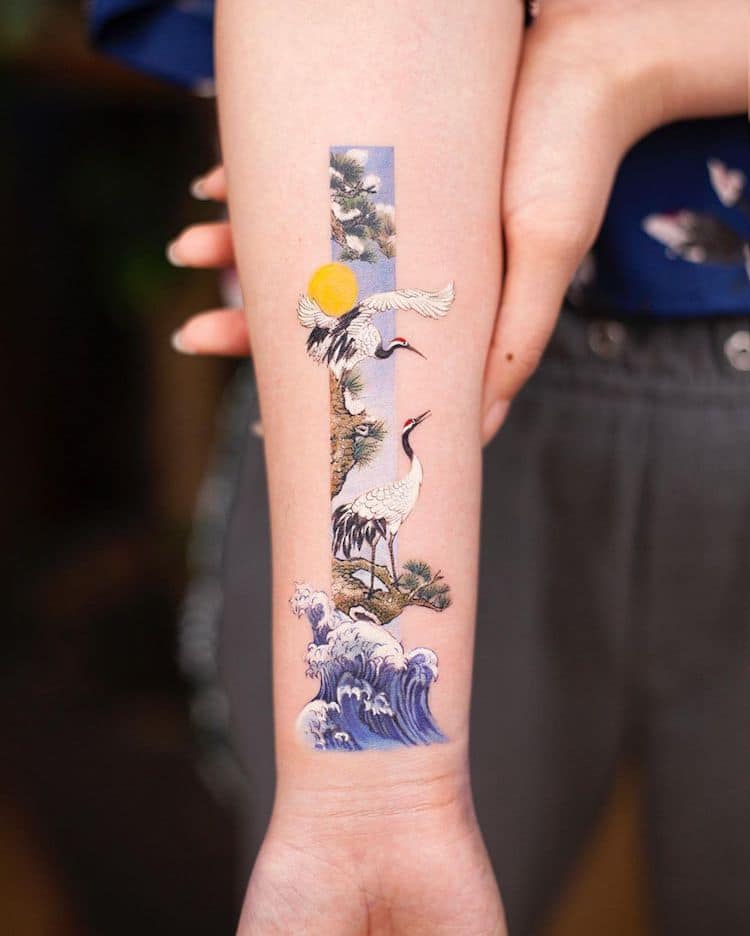
Chinese Tattoo Meanings: The Basics
Chinese tattoos can hold a variety of meanings, often drawing from the rich cultural and historical heritage of China. However, it’s important to approach Chinese tattoos with cultural sensitivity and awareness, as certain characters and symbols may carry meanings that differ from their Western interpretations or may be appropriated. Here are some common Chinese tattoo meanings:
Chinese Characters
Chinese characters are often chosen for their aesthetic appeal and profound meanings. Some popular Chinese character tattoos include:
Love (爱): Symbolizes affection, care, and attachment.
Strength (力量): Represents physical or inner strength and resilience.
Courage (勇气): Signifies bravery and fearlessness.
Wisdom (智慧): Reflects knowledge, intelligence, and good judgment.
Peace (和平): Denotes tranquility and harmony.
Family (家庭): Represents family bonds and connections.
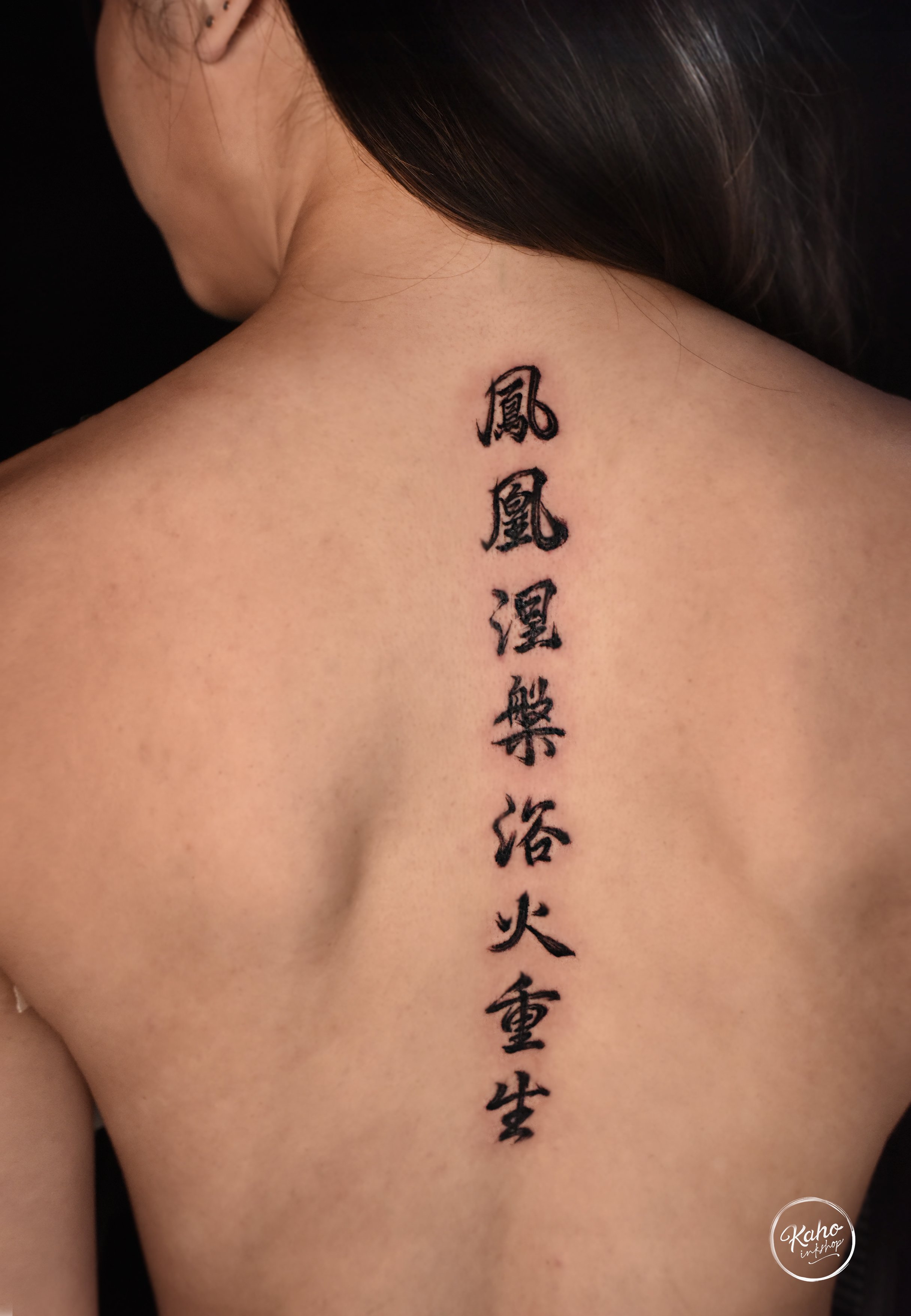
Chinese Zodiac
Chinese tattoo meanings are deeply rooted in the country’s rich cultural heritage and traditions. The Chinese zodiac, also known as Shengxiao, is an ancient astrological system that assigns each year to one of twelve animal signs: rat, ox, tiger, rabbit, dragon, snake, horse, goat (or sheep), monkey, rooster, dog, and pig. Each animal sign is believed to have a unique set of personality traits and characteristics that influence the lives of those born in that year.
People often choose to get tattoos of their Chinese zodiac animal as a way to celebrate their birth year and honor its attributes. For example, someone born in the Year of the Dragon might choose to get a tattoo of a dragon to represent their strength, power, and good fortune. Meanwhile, someone born in the Year of the Sheep might opt for a tattoo of a sheep to symbolize their gentleness, kindness, and artistic nature.
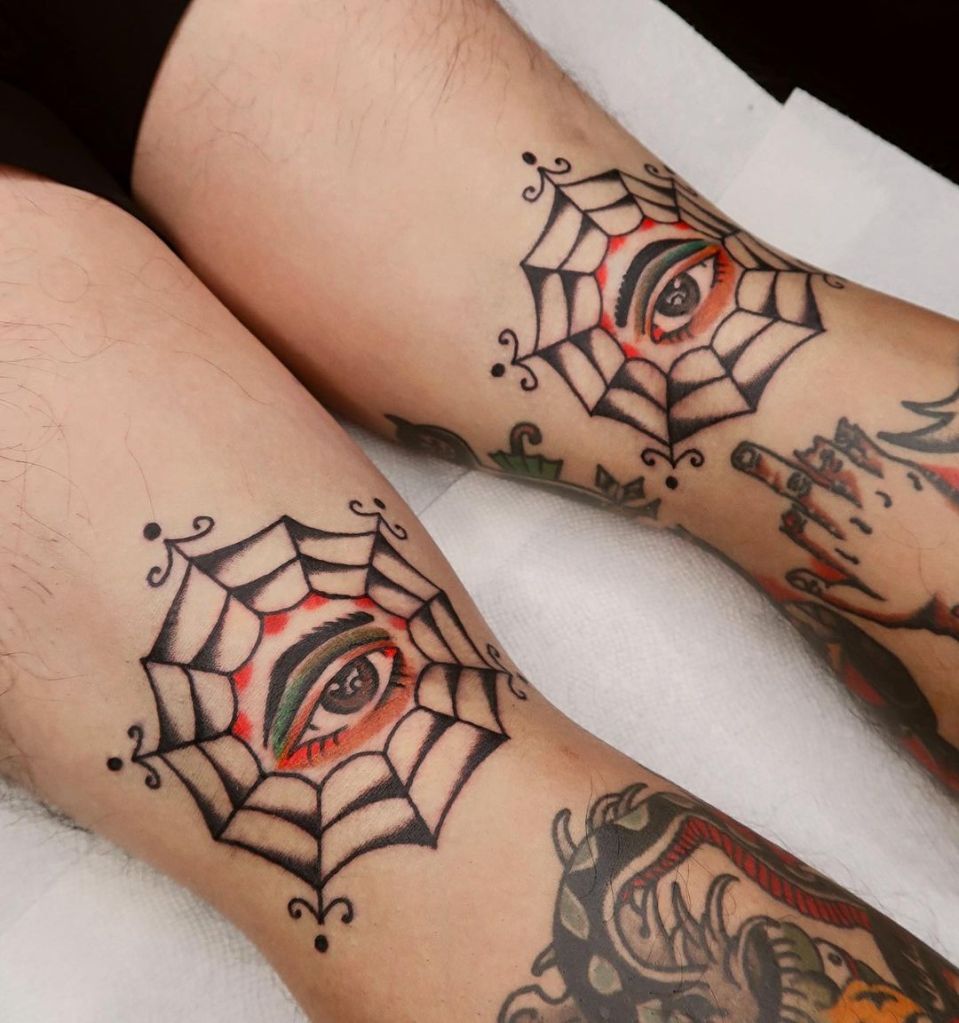
In addition to celebrating their own birth year, people also choose Chinese zodiac tattoos based on their personal connection to a particular animal sign. For example, someone who loves horses might choose to get a tattoo of a horse, even if they were not born in the Year of the Horse. They may identify with the horse’s free spirit, energy, and independence.
Chinese zodiac tattoos can be highly symbolic and meaningful, not just for individuals but also for entire families or groups of friends. For example, siblings might all choose to get tattoos of their respective zodiac animals to represent their bond and shared cultural heritage.
However, it’s important to note that while Chinese zodiac tattoos can be beautiful and culturally significant, it’s also crucial to understand the potential risks and controversies surrounding them. Some people argue that non-Chinese people getting Chinese zodiac tattoos can be seen as cultural appropriation, especially if they do not fully understand the cultural significance of the symbols they are using.
In summary, Chinese tattoo meanings are deeply rooted in the country’s rich cultural heritage and traditions, particularly in the astrological system of the Chinese zodiac. People often choose to get tattoos of their zodiac animal to celebrate their birth year and its associated personality traits, as well as their personal connection to a particular animal sign. These tattoos can be highly symbolic and meaningful, representing not just individuals but also families and groups of friends. However, it’s important to approach Chinese zodiac tattoos with sensitivity and cultural understanding.
Dragons
In Chinese culture, tattoos have been a part of tradition for centuries and are often considered an art form. Each tattoo carries its own unique meaning and significance, especially when it comes to Chinese tattoo designs. One of the most popular and revered Chinese tattoos is the dragon tattoo.
Dragons have a special place in Chinese culture and mythology. They are believed to symbolize power, strength, and good fortune. In ancient times, dragons were associated with the emperor and imperial authority, making them a symbol of power and protection.
A dragon tattoo can be interpreted in many ways, but typically, it represents the energy of yang. Yang is a masculine force that is associated with light, warmth, and activity. It is believed to be the opposite of yin, which is a feminine force associated with darkness, coolness, and passivity.
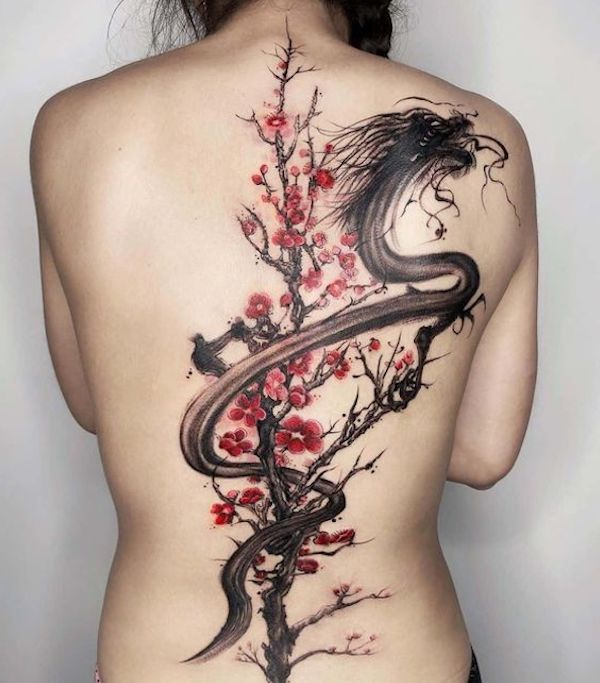
The dragon tattoo is often depicted as a fierce and powerful creature, with scales, sharp claws, and a long tail. It can be seen as a symbol of strength and courage. Some people choose to get a dragon tattoo to represent their own inner strength and determination. Others may get it as a form of protection or to show their allegiance to a certain group or organization.
There are many variations of the dragon tattoo in Chinese culture, each with its own unique symbolism. For example, a dragon tattoo with five claws is believed to represent the emperor, while a dragon with four claws is associated with nobility and high-ranking officials. A dragon with three claws is said to represent commoners and is believed to bring good luck and fortune.
In conclusion, Chinese tattoo meanings are deeply rooted in culture and tradition. The dragon tattoo is one of the most popular and revered Chinese tattoos because it embodies power, strength, and good fortune. It represents the energy of yang and can be interpreted in many different ways. Whether you choose to get a dragon tattoo for its powerful symbolism or simply for its aesthetic appeal, it is a meaningful and significant tattoo design that will always be appreciated.
Chinese Calligraphy
In China, calligraphy is more than just a form of writing – it is a highly respected art form that has been practiced for centuries. Calligraphy is all about the beauty and expressiveness of written words, with each stroke being carefully crafted to convey meaning and emotion.
When it comes to Chinese tattoo meanings, calligraphy can add an extra layer of significance to the design. Depending on the style of calligraphy used, the tattoo can reflect traditional cultural values or contemporary aesthetics.
One popular style of calligraphy is the “regular script,” which is known for its balance and harmony. This style is often associated with Confucianism and represents the importance of order and discipline in everyday life. A tattoo featuring regular script could symbolize a person’s desire for structure and balance in their own life.
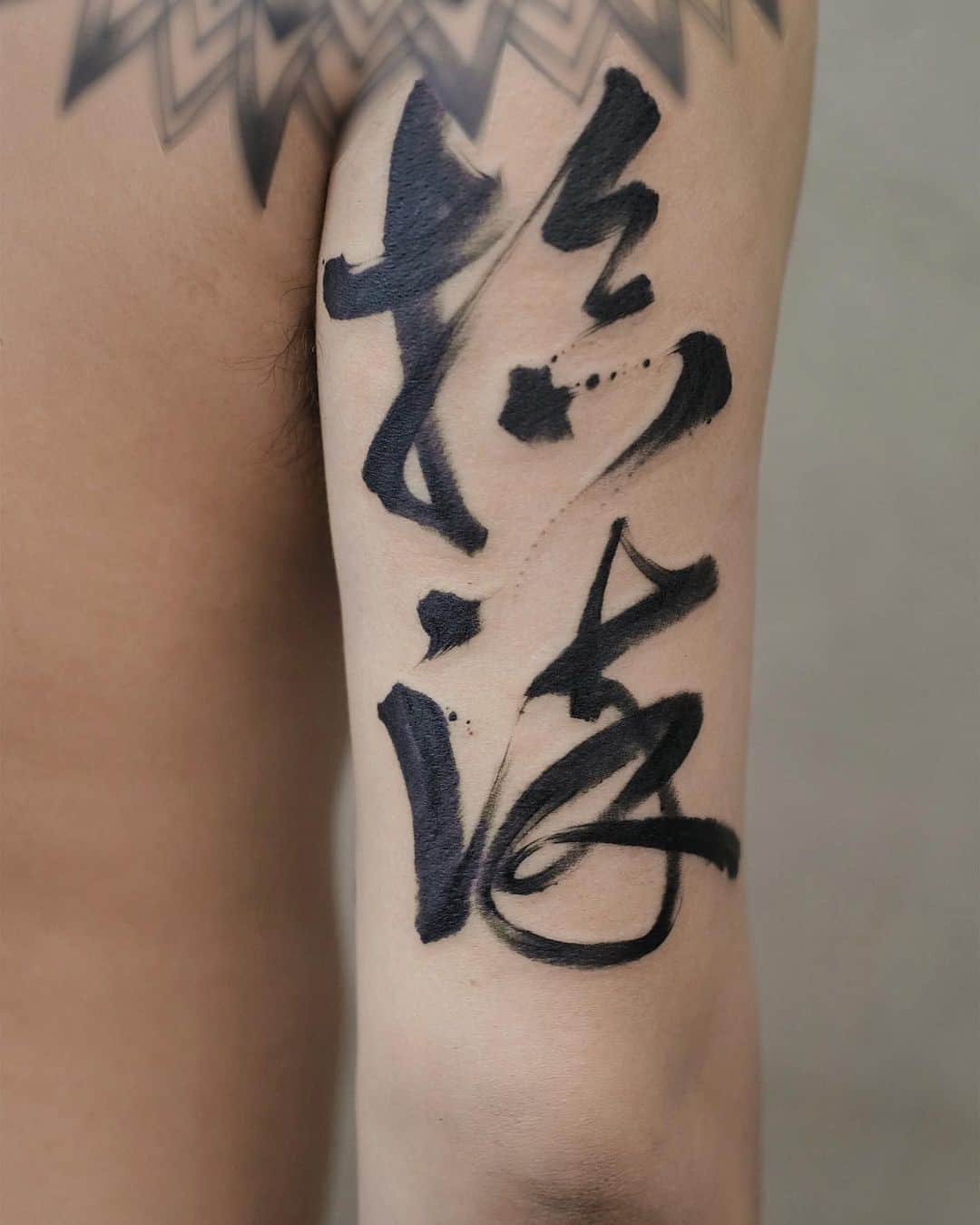
Another style of calligraphy commonly used in tattoos is the “running script.” This style is characterized by its flowing, cursive strokes and is often associated with Taoist philosophy. A tattoo featuring running script could represent a person’s desire for freedom and spontaneity in their life.
The “seal script” is another popular style of calligraphy, which features square, concise characters. This style is often used for official documents and represents authority and power. A tattoo featuring seal script could symbolize a person’s strength and position of influence.
Finally, the “cursive script” is a more modern style of calligraphy that emphasizes individual expression and fluidity. This style is characterized by its loose, artistic strokes and is often used in contemporary art and design. A tattoo featuring cursive script could represent a person’s creativity and desire for self-expression.
Overall, the different styles of Chinese calligraphy can add layers of meaning and symbolism to tattoos. Whether you choose a traditional style to represent cultural values or a modern style to express your individuality, a Chinese calligraphy tattoo can be a powerful and meaningful work of art.
Buddhist Symbols
Chinese tattoo art is a popular form of body art that has been around for centuries. One of the most common themes in Chinese tattooing is Buddhism, which is deeply rooted in Chinese culture and history. Tattoos of Buddhist symbols such as the Om symbol, the Eightfold Path, or the Dharma Wheel are widely used to express spirituality, mindfulness, and a connection to Buddhist teachings.
The Om symbol, also known as Aum, is a sacred sound and spiritual icon in Hinduism, Buddhism, and Jainism. In Buddhism, the Om symbol represents the essence of the universe, the ultimate reality, and the oneness of all things. Therefore, getting an Om symbol tattooed on one’s body can signify a deep connection to the universe and a desire to achieve enlightenment.
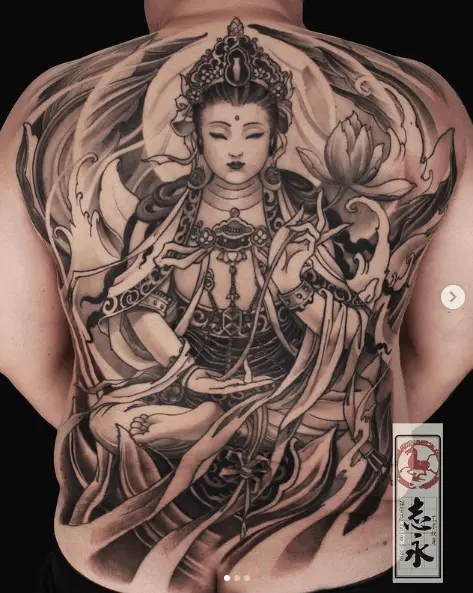
The Eightfold Path is a central concept in Buddhist philosophy and refers to the eight steps that lead to the cessation of suffering and the attainment of enlightenment. These eight steps are right understanding, right intention, right speech, right action, right livelihood, right effort, right mindfulness, and right concentration. Getting a tattoo of the Eightfold Path can symbolize a commitment to following this path towards inner peace and self-realization.
The Dharma Wheel, also known as the Dharmachakra, is a symbol of Buddhist teachings and represents the Buddha’s teaching of the Four Noble Truths. The Dharma Wheel has eight spokes that represent the Eightfold Path. A tattoo of the Dharma Wheel can symbolize a devotion to learning and following Buddhist teachings, as well as a desire to spread these teachings to others.
In conclusion, Chinese tattoos of Buddhist symbols are not just decorative but carry deep spiritual meanings. They serve as a reminder of one’s personal beliefs, values, and goals. These tattoos can provide a sense of connection to something greater than oneself and offer a daily reminder to stay mindful on the journey of life. However, it is important to do thorough research and ensure that the chosen symbol is understood and respected in its original cultural context before getting it tattooed.
Yin and Yang
Chinese tattoo culture has gained popularity and significance in recent years, particularly with the rise of tattoo enthusiasts seeking to embody deeper meanings through their tattoos. One of the most popular motifs found in Chinese tattoo designs is the Yin and Yang symbol, which represents the balance between opposing forces, harmony, and interconnectedness.
The Yin and Yang symbol is an ancient Chinese concept that dates back over 3,000 years and is rooted in Taoism and Confucianism. The symbol consists of two halves – one black and one white – which represent opposing yet complementary forces in the universe. Yin is associated with darkness, feminine energy, passivity, and introspection, while Yang represents light, masculine energy, activity, and extroversion. Together, they create a harmonious balance that signifies the natural order of things.
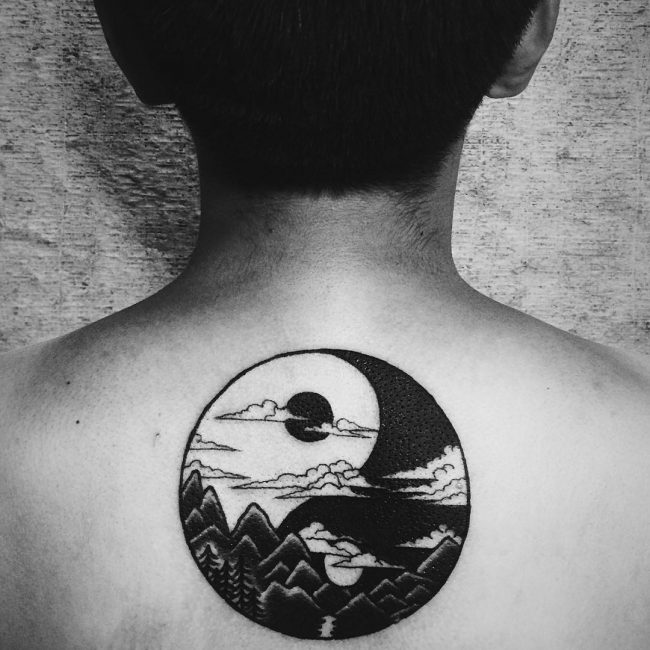
In Chinese tattoo culture, the Yin and Yang symbol is often used to represent the duality of life. It reminds us that there are always two sides to every story, and that we must embrace both the good and bad experiences in life. It also represents the interconnectedness of all things in the universe, as each half of the symbol depends on the other for balance and harmony.
Apart from the Yin and Yang symbol, there are numerous other Chinese characters and symbols that carry deep meanings and are used frequently in tattoo art. For example, the dragon is a popular motif that symbolizes power, strength, good luck, and prosperity. The Phoenix, on the other hand, represents rebirth, renewal, and transformation.
Other common Chinese tattoo motifs include the Koi fish, which represents perseverance, determination, and good fortune, and the Lotus flower, which symbolizes purity, enlightenment, and spiritual growth. Each symbol carries its unique meaning, and tattoo enthusiasts carefully select the design that resonates with them the most.
In conclusion, Chinese tattoo culture remains an essential part of tattoo art, with many people seeking to embody deeper meanings through their tattoos. The Yin and Yang symbol is one of the most popular motifs, representing balance, harmony, and interconnectedness. Other Chinese symbols such as dragons, Phoenix, Koi fish, and Lotus flower also carry deep meanings and are commonly used in tattoo designs. Ultimately, Chinese tattoos are a beautiful way to express oneself, celebrate culture, and honor ancient traditions.
Chinese Proverbs and Quotes
Chinese tattoos have become increasingly popular among people all over the world, as they not only look visually appealing but also carry deep cultural significance. Chinese tattoos often feature meaningful proverbs, idioms, or quotes that reflect the wearer’s beliefs and values.
One of the most common types of Chinese tattoos is the proverb tattoo. Proverbs are short sayings that convey a wise or insightful message. Chinese culture has a rich history of proverbs, many of which have been passed down for generations. These proverbs cover a wide range of themes, from love and friendship to perseverance and success. The meaning behind a proverb tattoo can be personal, reflecting the wearer’s own interpretation of the proverb’s message.
Another type of Chinese tattoo is the idiom tattoo. Idioms are expressions that have a figurative meaning beyond their literal translation. Chinese idioms often draw on nature, animals, or historical events to convey their message. Many Chinese idioms have become well-known throughout the world, such as “a journey of a thousand miles begins with a single step” and “when in Rome, do as the Romans do.” A person may choose an idiom tattoo because the message resonates with them on a personal level or because it reflects a particular moment or experience in their life.
Chinese quote tattoos are also popular among those seeking meaningful ink. Quotes can come from famous Chinese philosophers, such as Confucius, Laozi, and Mencius, or from modern-day figures and celebrities. Chinese quotes often focus on the themes of wisdom, kindness, and perseverance, and can offer inspiration and guidance to the wearer.
It’s important to note that Chinese culture places great importance on the symbolism and meaning behind certain words and phrases. Therefore, before getting a Chinese tattoo, it’s essential to research the phrase’s meaning and ensure that it accurately represents your intended message. Additionally, it’s crucial to choose a reputable tattoo artist who is experienced in Chinese calligraphy and can accurately translate and ink the desired phrase.
In conclusion, Chinese tattoos have become a popular way for people to express their beliefs and values through meaningful proverbs, idioms, or quotes. These tattoos are not only visually pleasing but also carry deep cultural significance, reflecting the rich history and philosophy of Chinese culture.
When considering a Chinese tattoo, it’s essential to research the meanings and cultural connotations behind the characters, symbols, or phrases you’re interested in. Ensure you have an accurate understanding of the cultural context and the potential implications of your chosen tattoo. If you’re not familiar with the Chinese language or culture, consulting a native speaker or a knowledgeable source can help prevent misunderstandings or inappropriate choices.
Examples of Chinese Tattoo Meanings
Chinese tattoos can be incredibly personal and meaningful to the person wearing them. Here are some examples of Chinese tattoo meanings and what they signify:
Dragon
Dragons hold significant importance in Chinese culture and are believed to bring good fortune. People usually get dragon tattoos to represent strength, power, and wisdom.
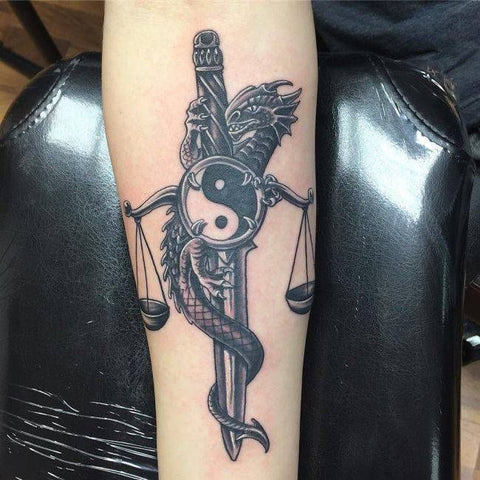
Koi Fish
Koi fish is a popular tattoo design, especially among those who have overcome significant obstacles in life. It symbolizes perseverance and determination and is a nod to the fish’s ability to swim upstream.
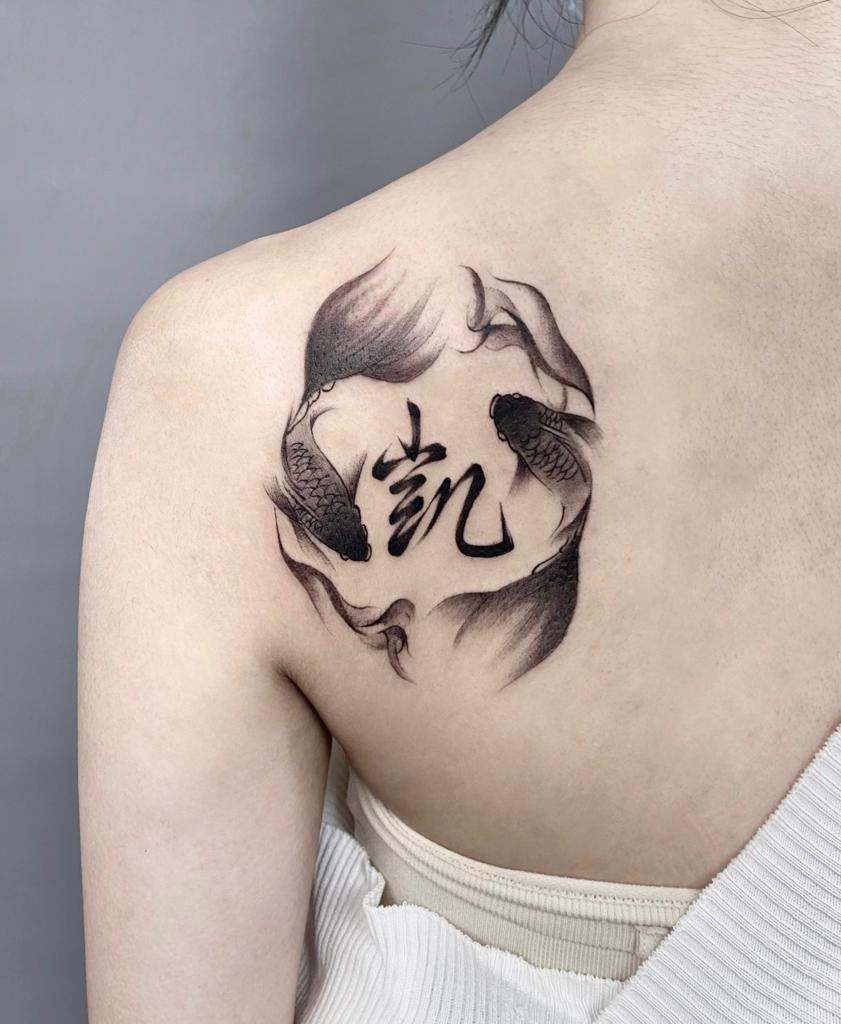
Lotus Flower
The lotus flower is often associated with Buddhism, and it symbolizes purity and enlightenment. People who get lotus flower tattoos are usually trying to connect with their spiritual side.
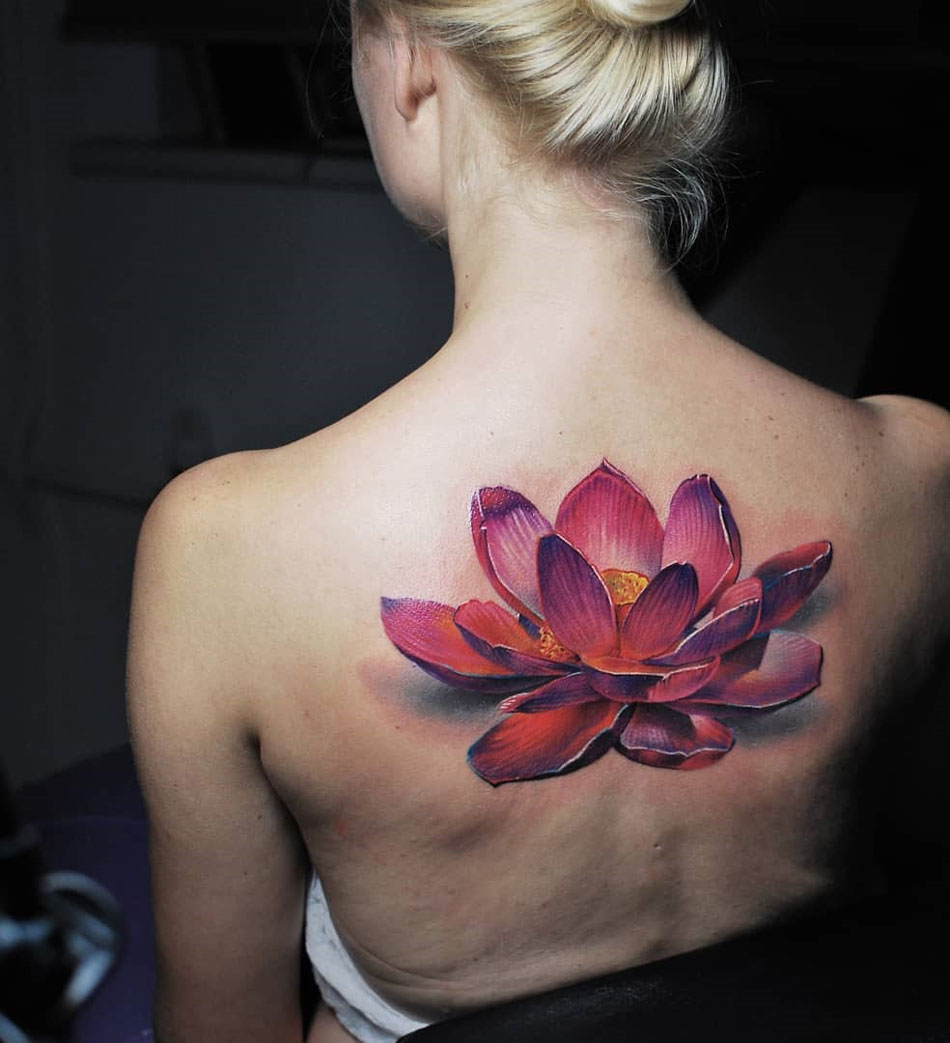
Phoenix
The phoenix is a mythical bird that represents rebirth and transformation. People who get phoenix tattoos are usually going through a significant change in their lives and want to mark this milestone.
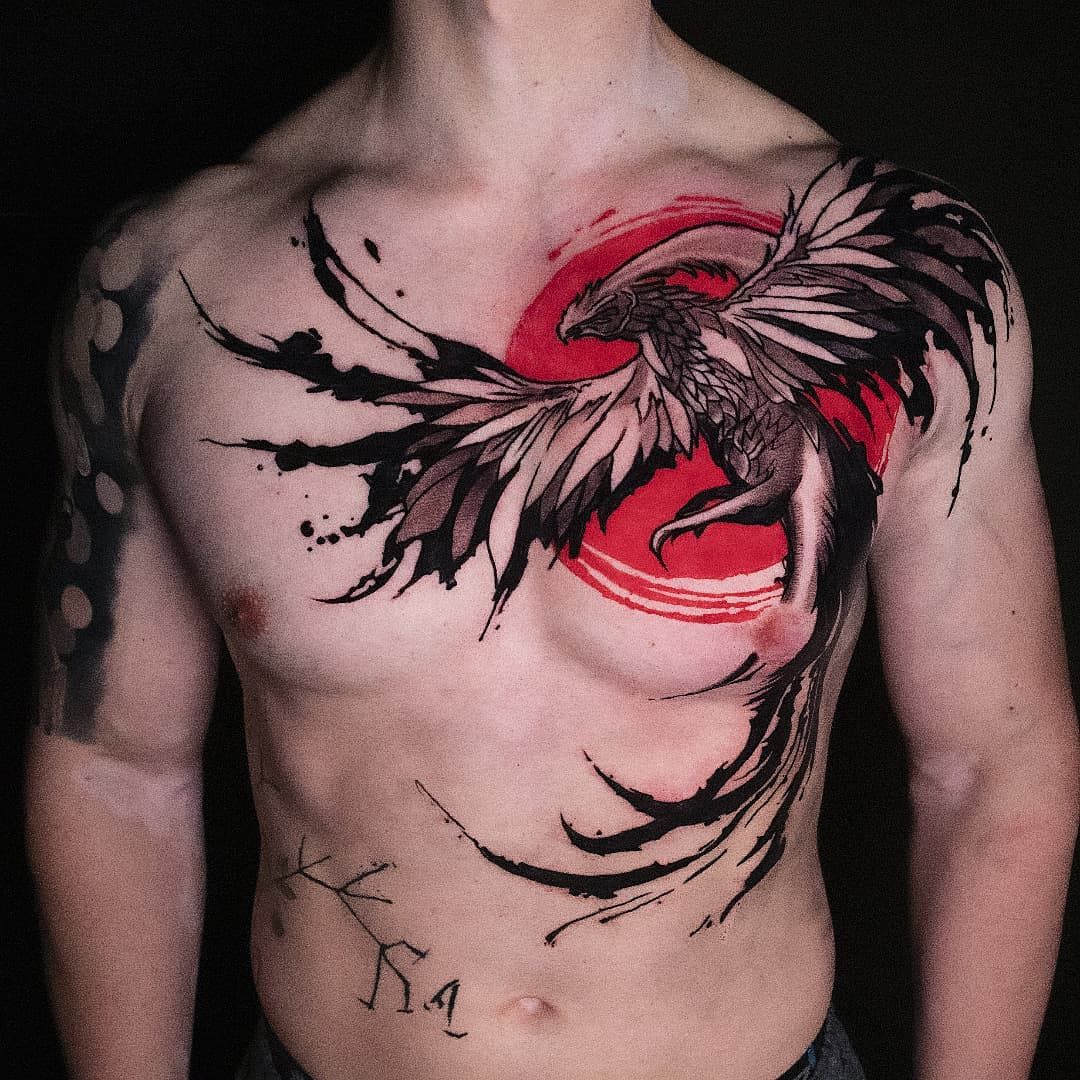
Tiger
Tigers are powerful animals, and they symbolize strength and courage. People often get tiger tattoos to signify their resilience and ability to overcome adversity.
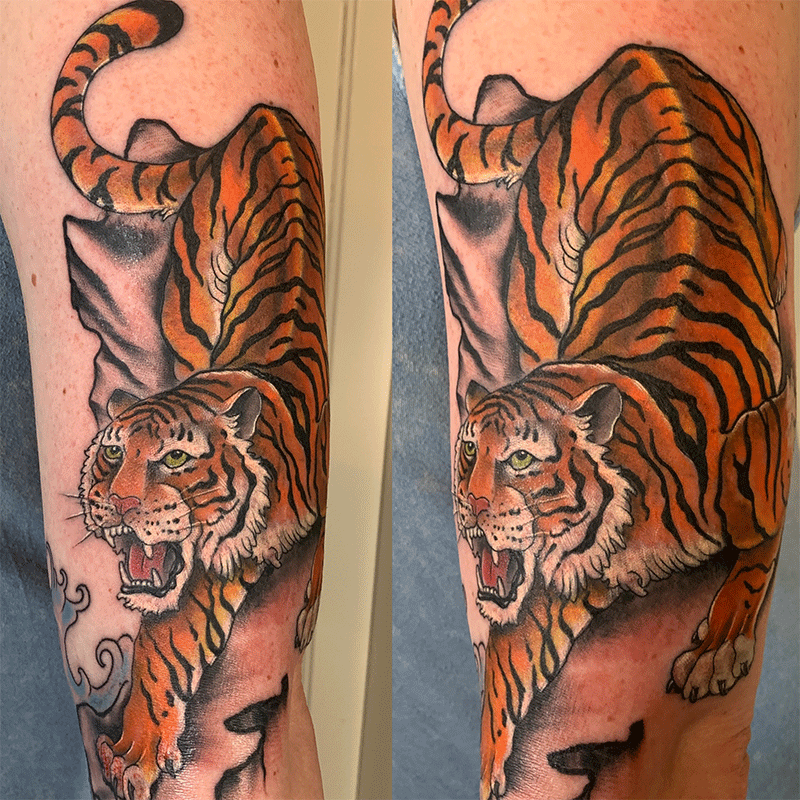
Comparing Chinese Tattoo Meanings
Chinese tattoos share some similarities to other tattoo designs found around the world. For instance, both Japanese and Chinese cultures use koi fish as a symbol of strength and endurance. However, some differences exist between these cultures’ interpretations, such as how the fish swims. In Japan, a koi swimming upward signifies the struggle for success, while a downward-swimming koi signifies failure. In contrast, Chinese culture does not differentiate the direction of the fish’s movement.
Another example involves the dragon, which is also a popular tattoo design in Western cultures. However, in China, the dragon is more than just a symbol of power or a monster to be slain. Instead, it represents prosperity, good fortune, and the emperor himself.
Conclusion
Chinese tattoos are a beautiful and meaningful way to express oneself, conveying deep and profound messages through intricate and beautiful designs. From dragons to koi fish, each symbol carries its own unique meaning, adding depth and richness to your tattoo design. When choosing a Chinese tattoo design, it is essential to consider your personality, research the meaning, check for accuracy, think about placement, and choose a reputable artist. By following these tips and respecting the culture’s heritage and symbolism, you can create a beautiful tattoo that will serve as a reminder of your values and beliefs.

I am Harvey Berry, a tattoo enthusiast who has immersed himself in the diverse world of ink, passionately exploring the beauty and artistry within each tattoo. My mission extends beyond uncovering the aesthetics of tattooing; it involves sharing in-depth knowledge across all aspects of this art form.
Fueled by genuine curiosity and love for every facet of tattooing, I have diligently crafted well-researched articles, with a special focus on the Tattoo Meaning of Impeccable Nest section. Here, my aim is to help the tattoo community gain a deeper understanding of the meanings and values embedded in each tattoo.
One of my primary goals is to encourage responsible decision-making when it comes to getting inked. I recognize that choosing to get a tattoo is a significant personal decision that requires careful consideration. Hence, I provide diverse resources covering the meaning of tattoos, the tattooing process, aftercare tips, and other valuable information.
Whether you are a seasoned tattoo enthusiast or embarking on your first exploration of the world of body art, I aspire to be a reliable resource for you at every step of your journey. I hope that my extensive knowledge of tattoos, especially in the Tattoo Meaning section, will assist you in finding inspiration to express yourself through the art of tattoos.
